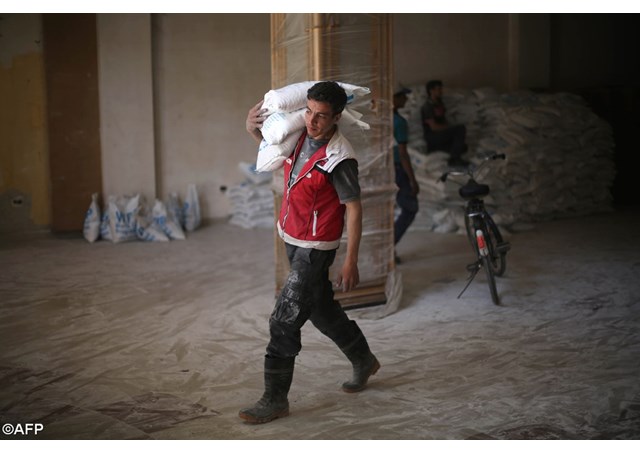
UN to airdrop humanitarian aid for besieged areas of Syria as 'last resort'

(Vatican Radio) The situation on the ground in Syria is deteriorating with little concern that humanitarian aid reach besieged cities. Staffan de Mistura, UN special envoy for Syria, on Thursday said the United Nations will take the ‘last resort’ option of air drops of humanitarian aid if access to besieged areas in Syria is not improved by June 1st.
He also said that without improved aid access and some restoration of the recent ‘cessation of hostilities’, the credibility of the next round of peace talks would be in question.
Government raids in the province of Homs killed more than 20 people on Thursday, causing the cancellation of Friday prayers in the city of Houla due to fears of further violence.
Jane Howard, Global Media Coordinator for the UN World Food Programme (WFP), spoke to Vatican Radio’s Francesca Sabatinelli about the dire need facing Syrians in besieged cities.
Listen to the full interview:
Eating grass to survive
Ms. Howard said that the situation in areas like Deir Ezzor where they are already carrying out airdrops is increasingly dire.
"Even in the last few weeks we've had reports that people are having to eat grass and just boiled vegetables to try and survive, because some of these places we've been unable to reach with truckloads of food for months and months, even a year or two years."
She said WFP is managing to feed nearly 4 million people every month, providing them with basic staples like rice, flour, and vegetable oil.
Despite this current number of people being fed, Ms. Howard said 18 areas in particular are very worrying. "Certain areas, 18 areas in particular, are giving us a lot of cause for concern because those are really under siege. That means that the parties that are surrounding them - we're talking about all sides here - won't let any food go in and out. Siege is really being used like a weapon of war."
Dangerous option
Ms. Howard said the reasons for considering airdrops of humanitarian aid a 'last resort' are several.
"First of all, you can't do it everywhere. You need to have a drop-zone which is big enough to drop the food into safely; you wouldn't want it to land on top of people. You can't do it in built-up urban areas so that rules out a lot of the places where people are under siege.
"You need to have security guarantees because in different parts of Syria, different people are controlling the airspace.
"At the end of the day, the real thing is that you can't drop the quantities that you can take in over land."
Ridiculous situation
As an example, Ms. Howard said the last six weeks of airdrops to the besieged town of Deir Ezzor could have been brought in a single over-land convoy.
"So, really, it's about the people on the ground letting us through. We've have repeatedly appealed to the different warring parties to let the food go through, because it's ridiculous that there are besieged areas maybe a few kilometres outside of Damascus, where you could drive there in an hour and a half. So airdrops are not the whole answer to the question. It's a much bigger question of humanitarian access."
| All the contents on this site are copyrighted ©. |


